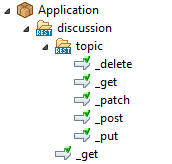Services for REST Resources Configured Using the Legacy Approach
When you build a REST application on your Integration Server by configuring resources using the legacy approach, you must include services that correspond to the HTTP methods you want to provide for each resource. These services must be named as follows:
Service | Description |
_get | Performs the GET method. |
_put | Performs the PUT method. |
_post | Performs the POST method. |
_patch | Performs the PATCH method. |
_delete | Performs the DELETE method. |
These services reside in folders on your
Integration Server in a directory structure that is specific to your application. For example, the discussion application described in
Configuring a REST Resource Using the
Legacy Approach might have the following structure as viewed from
Software AG Designer:
In addition to the _get, _put, _post, _patch, and _delete services, you can also place a special service named _default in one or more of the application folders. Integration Server executes this service if a REST request specifies an HTTP method that is not represented by a service in the folder. For example, suppose the folder contains the _get, _put, and _post services, but no _patch or _delete service. If the client issues a DELETE request, Integration Server will execute the _default service, and pass “DELETE” to it in the $httpMethod variable.
Note:
By default, Integration Server does not add the $httpMethod variable in the input pipeline with the requested HTTP method while processing REST requests. If you want Integration Server to add this variable in the input pipeline, you can set the server configuration parameter, watt.server.rest.addHTTPMethodToInputPipeline to true. For more information about the watt.server.rest.addHTTPMethodToInputPipeline server configuration parameter, see webMethods Integration Server Administrator’s Guide.
If a request specifies an HTTP request method that is not represented by a service in the folder and there is no _default service in the folder, the request fails with the “404 Not Found” or “405 Method Not Allowed error.” Integration Server issues 404 if the first token in the URI does not exist in the namespace, or 405 if one or more tokens in the URI identify elements in the namespace but the URI does not correctly identify a REST resource folder and a service to execute.
Example 1
A REST resource’s folder contains the _get, _post, and _default services:
If the client sends a... | Integration Server responds by... |
GET request | Executing the _get service |
POST request | Executing the _post service |
DELETE request | Executing the _default service |
Example 2
A REST resource’s folder contains the _get, _put, and _delete services:
If the client sends a... | Integration Server responds by... |
GET request | Executing the _get service |
PUT request | Executing the _put service |
POST request | Issuing error “405 Method Not Allowed” |
Additional possible uses for the _default service are:

Direct all REST requests through common code before branching off to individual GET, PUT, POST, PATCH, or DELETE methods.

Make PUT and POST processing the same by directing PUT and POST requests to the same code.

